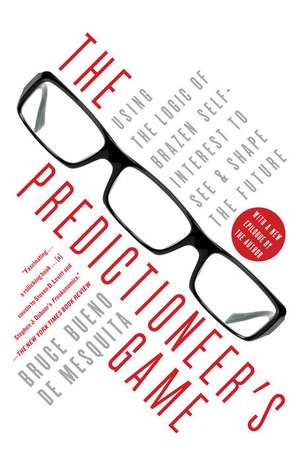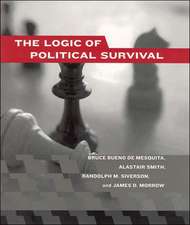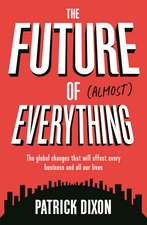The Predictioneer's Game: Using the Logic of Brazen Self-Interest to See and Shape the Future
Autor Bruce Bueno de Mesquitaen Limba Engleză Paperback – 30 sep 2010
Revealing the origins of game theory and the advances made by John Nash, the Nobel Prize—winning scientist perhaps best known from A Beautiful Mind, Bueno de Mesquita details the controversial and cold-eyed system of calculation that he has since created, one that allows individuals to think strategically about what their opponents want, how much they want it, and how they might react to every move. From there, Bueno de Mesquita games such events as the North Korean disarmament talks and the Middle East peace process and recalls, among other cases, how he correctly predicted which corporate clients of the Arthur Andersen accounting firm were most likely engaged in fraudulent activity (hint: one of them started with an E). And looking as ever to the future, Bueno de Mesquita also demonstrates how game theory can provide successful strategies to combat both global warming (instead of relying on empty regulations, make nations compete in technology) and terror (figure out exactly how much U.S. aid will make Pakistan fight the Taliban).
But as Bueno de Mesquita shows, game theory isn’t just for saving the world. It can help you in your own life, whether you want to succeed in a lawsuit (lawyers argue too much the merits of the case and question too little the motives of their opponents), elect the CEO of your company (change the system of voting on your board to be more advantageous to your candidate), or even buy a car (start by knowing exactly what you want, call every dealer in a fifty-mile radius, and negotiate only over the phone).
Savvy, provocative, and shockingly effective, The Predictioneer’s Game will change how you understand the world and manage your future. Life’s a game, and how you play is whether you win or lose.
From the Hardcover edition.
Preț: 115.94 lei
Nou
Puncte Express: 174
Preț estimativ în valută:
22.18€ • 23.23$ • 18.36£
22.18€ • 23.23$ • 18.36£
Carte tipărită la comandă
Livrare economică 07-21 aprilie
Preluare comenzi: 021 569.72.76
Specificații
ISBN-13: 9780812979770
ISBN-10: 081297977X
Pagini: 262
Ilustrații: CHARTS THROUGHOUT
Dimensiuni: 135 x 203 x 15 mm
Greutate: 0.21 kg
Editura: Random House Trade
ISBN-10: 081297977X
Pagini: 262
Ilustrații: CHARTS THROUGHOUT
Dimensiuni: 135 x 203 x 15 mm
Greutate: 0.21 kg
Editura: Random House Trade
Notă biografică
Bruce Bueno de Mesquita is the Julius Silver Professor of Politics at New York University and a senior fellow at the Hoover Institution at Stanford University. A specialist in policy forecasting, political economy, and international security policy, he received his doctorate in political science from the University of Michigan. Bueno de Mesquita is the author of fifteen books and more than one hundred articles as well as numerous pieces in major newspapers and magazines. He has appeared on all the major networks as well as television broadcasts in Brazil, China, Korea, the Netherlands, and elsewhere. His previous book, The Strategy of Campaigning, was co-authored with Kiron Skinner, Serhiy Kudelia, and Condoleeza Rice. He lives in San Francisco and New York City.
From the Hardcover edition.
From the Hardcover edition.
Extras
Chapter One
WHAT WILL IT TAKE TO PUT YOU IN THIS CAR TODAY?
GAME THEORY" IS a fancy label for a pretty simple idea: that people do what they believe is in their best interest. That means they pay attention to how others might react if they choose to do one thing or another. Those "others" are anyone believed to be a prospective supporter or opponent. Looking at how their interests intersect or collide is basic to assessing potential outcomes of decision making. To get a good grip on what people are likely to do requires first approximating what they believe about the situation and what they want to get out of it. By estimating carefully people's wants and beliefs, anyone can make a reliable forecast of what each and every one of them will do. And if you can predict what will happen, then you can also predict what will happen if you alter what people believe about a situation. This is, in short, how we can use the same logic both for prediction and for engineering the future.
I'll provide a more detailed examination of game theory in the next two chapters, but first, as promised, let me illustrate what I'm talking about with the example of how best to buy a new car. A new car purchase is a costly bargaining experience for most of us because most of us are bad at it. A little strategic reasoning can go a long way to improve the experience. If you follow the ideas here, you will not only have a happier time buying a car, you'll also pay a lot less money.
New cars are mostly bought in one of two ways. Most of us go to a dealership, test-drive a vehicle, maybe fall in love with it, and engage in a most unpleasant negotiation over the price. A smaller number of us hate that experience enough that we buy cars through the Internet. This usually means getting price bids from a few local dealers and then going to one of them to get the car. That's slightly better, but there's yet a better way to buy cars that I urge you to try.
What's wrong with the most popular means of car shopping? Pretty much everything. To start with, you, the buyer, invest your time, and probably the time of some family members as well, at a car dealership. The salesperson knows that few people enjoy dealing with them. They know that they rate near the bottom of anybody's scale of occupational trustworthiness. (The Jobs Rated Almanac weights occupations by numerous factors and reports that auto sales ranks 220th out of 250 occupations.1 Apparently it's worse to be a taxi driver, cowboy, or roustabout, but not by much.) But there you are subjecting yourself to the salesperson's pitch, standing before a car dealer in his or her place of business, feeling compelled to haggle over the price, probably to your embarrassment and certainly to your disadvantage. The whole time you're talking to the dealer you're revealing information that sets you up to pay too much.
Being there is what game theorists call a "costly signal." It's a costly signal because your expenditure of time and energy announces that you want to buy, that there's a good chance you'll buy from the dealership you're visiting rather than go elsewhere, and, especially if you have kids with you, that you want to get out of there as quickly as possible. That first step, then, your simply being there, translates into strengthening the salesperson's hand in getting a good price. They believe you're ready to buy, and you've done precious little to dissuade them. Score one for the dealer, none for you.
Now as it happens, costly signals are usually good things for you. They show you're serious about what you are saying and doing. That can give you credibility, as we will see in later chapters. Unfortunately, costly signals can have just the opposite effect when you're a shopper. They announce your eagerness to buy, and that makes it tough to get a good deal.
The situation was bad enough when you walked in the dealership door, but it only gets worse once a conversation begins. Although you've probably done homework online and know something about the invoice price of the car you want, there's a great deal you don't know that the dealer does know. When you say you want a gray car, or a blue one, or yellow, you don't know whether you've picked the hottest color in the greatest demand or a color that hardly anyone wants. You may not even know that there can be a price difference of many hundreds of dollars between choosing, say, red or yellow because the dealer treats that choice just the way options are treated-as one more place to pile on costs. You don't know enough about the local supply and demand to have a good retort when Pat, the salesperson, tells you the vehicle you want is in short supply. Translation: The invoice price on the Internet? Forget it-that's not going to happen for the car you want. Score another point for the dealer, and still none for you.
As anyone who's ever bought a new car knows, Pat will almost certainly ask you, "What will it take to put you in this car today?" Now you're cornered. If you name a really low price, Pat, who has been playing up to you, looks hurt or loses interest, or maybe even becomes just a little rude. Control of the discussion is now fully out of your hands. You feel bad about the lowball offer, you want to establish your good faith, and so you come back with a number close to what you're actually prepared to pay because you want to keep the conversation going. So Pat has gotten you to put a credible price on the table. Now, after praising the offer, Pat announces that this is a price that can be taken to the sales manager for approval. This is when the price gets jacked up a little bit more to close the deal. Rather than worrying about what the sales manager will say as you sit at Pat's desk, sipping dishwater-thin coffee from a paper cup, ask yourself, Is it possible that Pat does not know the vehicle's price?! Hard to believe, since that's what Pat does all day-sell cars.
You have now given Pat almost all the important information that was in your hands. Meanwhile, you have learned very little about the true state of the market. You may believe that Pat is working on your behalf with the sales manager, telling the manager what a good customer you are and how nice your family is. My guess is that they talk about last night's football game or how lousy that coffee is, and then Pat emerges with a price.
After some haggling over minor details, hands are shaken and a deal is struck. You feel efficacious. You got a "good" price that you will boast about to your friends. Pat assures you that this is so-and maybe it is, but then the nature of any sale is that the buyer and the seller are both happy with the price; otherwise there's no deal. You really do not know that you've gotten the best price for the car, just as the salesperson does not know that you paid the most you were prepared to pay. But Pat controlled the agenda, revealed little, and worked your price up. That is one more point for the dealer and maybe, just maybe, one for you too. The winner: the dealer by at least 3 or 4 to 1.
Now, the Internet can work much better. There is lots of useful information to be had, including information that car dealers don't want buyers to know. It's a great source for finding out a car's invoice price, for example, and Internet car purchase services generally guarantee that you'll be contacted by two or three dealers who at least know that you've already done some online comparison shopping. Still, making a deal requires going to a dealership. Once you are in the dealership, everything that happens in the first way of buying cars is now going to happen again, except that Pat already knows you're interested at the price quoted online. Maybe Pat says the exact car you asked about isn't available. Sure, it could be special-ordered, but that will take a long time. Maybe Pat offers you a seemingly good deal on a different car and the information gained on the Internet fades in importance. How about a similar car with a few extras-maybe a sunroof, a super-duper sound system, special trim, whatever-that you really don't want? At least that car is on the dealer's lot, if only for just a little bit more money. Or maybe you close the deal on the car you asked about at the price quoted online. Well, you're probably closer to the lowest price the dealer will take, but in all likelihood you are not there. After all, they don't quote a price to you that they expect you to bid up from; they anticipate you're going to look for ways to cut their price. It must have some give left in it.
So, how else can you buy a car? Here's what I recommend so that information flows to you and very little information flows the other way; so that beliefs change in your favor and not in favor of the seller; so that prospective sellers are compelled by self-interest to reveal their lowest price (their reservation price, as economists call it) and you are not.
It is always advantageous to control the agenda in a negotiation. In the car-buying context, that means constructing the conversation so that the seller puts her best price on the table knowing that it will not be accepted right now no matter how good it is. To achieve this, the seller needs to be told the game you are playing, including that you're serious about buying a car. The game goes like this:
Do your homework and decide exactly what car you want to buy. You may go to dealerships for this purpose-I do not, it's too easy to get sucked in-or you may search online to find the car that best fits your needs. Decide what you value. Is it safety over performance? Style over comfort? Is the color important enough that you'll pay a premium for one rather than another? Know what options you want and how the options are bundled (sports package, safety package, sound system, etc.). When you know what car you want, including the options, the color, the model, everything, then and only then let your fingers do the walking. Find every dealer that sells the car brand you want within a radius of maybe twenty to fifty miles of your home. For most of us, urban dwellers that we are, that will be a goodly number of dealerships.
Telephone each dealership in the radius you picked. Don't worry about having to bring the car to a distant dealer for servicing. The manufacturer provides the warranty, not the dealer. Ask to be connected to a salesperson and tell the person precisely what you are doing. Here is my typical spiel: "Hello, my name is Bruce Bueno de Mesquita. I plan to buy the following car [list the exact model and features] today at five p.m. I am calling all of the dealerships within a fifty-mile radius of my home and I am telling each of them what I am telling you. I will come in and buy the car today at five p.m. from the dealer who gives me the lowest price. I need to have the all-in price, including taxes, dealer prep [I ask them not to prep the car and not charge me for it, since dealer prep is little more than giving you a washed car with plastic covers and paper floormats removed, usually for hundreds of dollars], everything, because I will make out the check to your dealership before I come and will not have another check with me."
If you are making your first call, be sure to tell the salesperson that you will tell the next dealer the price you've been quoted. After the first call, make sure the future salespeople know that you will be repeating whatever is the lowest price offered to you so far. That way, future dealers know what price they must beat, and the dealer you are currently talking to knows that if he wants to have a shot at selling you a car, he had better quote his lowest price. Pat's hands are really tied. Trying to eke out a higher price just means a worse chance of selling you a car. That advantage hardly ever arises when you go to a dealer and give Pat complete control. Instead, you have set up an auction in which everyone knows that they have one chance to make the best bid.
Dealers don't like getting these phone calls. Their typical first response is, "Sir, you cannot buy a car over the phone." My reply: "Well, I have purchased many cars this way, so maybe I can't buy a car from you over the phone, but I know I can from others. So if you do not want to sell a car to me, that is fine." That is the end of the conversation with a few dealers, but not many. The common follow-up is a line salespeople like to use on the showroom floor when you tell them you are shopping around. "Sir, if I quote a price to you, the next dealer will quote fifty dollars less and you'll buy it from him." Pat has reverted to the standard approach and is now trying to regain control by making me feel I should be willing to pay an extra $50, as if I owe at least that to good old Pat. My response: "That's right. I'll buy it from the other dealer. So, Pat, if you can quote me that fifty dollars less, this is your opportunity to do so." Then they often say, "Believe me, come in, we have the best prices in town." The reply, "Good, then you should be happy to quote the price to me now because you are confident it is the best price. The only reason not to tell me the price on the phone is because you think it will be beaten." If the conversation has continued-and it does with a substantial portion of dealerships-Pat will quote a price.
I arrive at the lowest-priced dealer, check in hand, just before 5:00 p.m. to close the deal. If there is any change in the terms I leave immediately and go to the second-best offer, and so forth. I have only once had to pay the second-best price quoted to me.
From the Hardcover edition.
WHAT WILL IT TAKE TO PUT YOU IN THIS CAR TODAY?
GAME THEORY" IS a fancy label for a pretty simple idea: that people do what they believe is in their best interest. That means they pay attention to how others might react if they choose to do one thing or another. Those "others" are anyone believed to be a prospective supporter or opponent. Looking at how their interests intersect or collide is basic to assessing potential outcomes of decision making. To get a good grip on what people are likely to do requires first approximating what they believe about the situation and what they want to get out of it. By estimating carefully people's wants and beliefs, anyone can make a reliable forecast of what each and every one of them will do. And if you can predict what will happen, then you can also predict what will happen if you alter what people believe about a situation. This is, in short, how we can use the same logic both for prediction and for engineering the future.
I'll provide a more detailed examination of game theory in the next two chapters, but first, as promised, let me illustrate what I'm talking about with the example of how best to buy a new car. A new car purchase is a costly bargaining experience for most of us because most of us are bad at it. A little strategic reasoning can go a long way to improve the experience. If you follow the ideas here, you will not only have a happier time buying a car, you'll also pay a lot less money.
New cars are mostly bought in one of two ways. Most of us go to a dealership, test-drive a vehicle, maybe fall in love with it, and engage in a most unpleasant negotiation over the price. A smaller number of us hate that experience enough that we buy cars through the Internet. This usually means getting price bids from a few local dealers and then going to one of them to get the car. That's slightly better, but there's yet a better way to buy cars that I urge you to try.
What's wrong with the most popular means of car shopping? Pretty much everything. To start with, you, the buyer, invest your time, and probably the time of some family members as well, at a car dealership. The salesperson knows that few people enjoy dealing with them. They know that they rate near the bottom of anybody's scale of occupational trustworthiness. (The Jobs Rated Almanac weights occupations by numerous factors and reports that auto sales ranks 220th out of 250 occupations.1 Apparently it's worse to be a taxi driver, cowboy, or roustabout, but not by much.) But there you are subjecting yourself to the salesperson's pitch, standing before a car dealer in his or her place of business, feeling compelled to haggle over the price, probably to your embarrassment and certainly to your disadvantage. The whole time you're talking to the dealer you're revealing information that sets you up to pay too much.
Being there is what game theorists call a "costly signal." It's a costly signal because your expenditure of time and energy announces that you want to buy, that there's a good chance you'll buy from the dealership you're visiting rather than go elsewhere, and, especially if you have kids with you, that you want to get out of there as quickly as possible. That first step, then, your simply being there, translates into strengthening the salesperson's hand in getting a good price. They believe you're ready to buy, and you've done precious little to dissuade them. Score one for the dealer, none for you.
Now as it happens, costly signals are usually good things for you. They show you're serious about what you are saying and doing. That can give you credibility, as we will see in later chapters. Unfortunately, costly signals can have just the opposite effect when you're a shopper. They announce your eagerness to buy, and that makes it tough to get a good deal.
The situation was bad enough when you walked in the dealership door, but it only gets worse once a conversation begins. Although you've probably done homework online and know something about the invoice price of the car you want, there's a great deal you don't know that the dealer does know. When you say you want a gray car, or a blue one, or yellow, you don't know whether you've picked the hottest color in the greatest demand or a color that hardly anyone wants. You may not even know that there can be a price difference of many hundreds of dollars between choosing, say, red or yellow because the dealer treats that choice just the way options are treated-as one more place to pile on costs. You don't know enough about the local supply and demand to have a good retort when Pat, the salesperson, tells you the vehicle you want is in short supply. Translation: The invoice price on the Internet? Forget it-that's not going to happen for the car you want. Score another point for the dealer, and still none for you.
As anyone who's ever bought a new car knows, Pat will almost certainly ask you, "What will it take to put you in this car today?" Now you're cornered. If you name a really low price, Pat, who has been playing up to you, looks hurt or loses interest, or maybe even becomes just a little rude. Control of the discussion is now fully out of your hands. You feel bad about the lowball offer, you want to establish your good faith, and so you come back with a number close to what you're actually prepared to pay because you want to keep the conversation going. So Pat has gotten you to put a credible price on the table. Now, after praising the offer, Pat announces that this is a price that can be taken to the sales manager for approval. This is when the price gets jacked up a little bit more to close the deal. Rather than worrying about what the sales manager will say as you sit at Pat's desk, sipping dishwater-thin coffee from a paper cup, ask yourself, Is it possible that Pat does not know the vehicle's price?! Hard to believe, since that's what Pat does all day-sell cars.
You have now given Pat almost all the important information that was in your hands. Meanwhile, you have learned very little about the true state of the market. You may believe that Pat is working on your behalf with the sales manager, telling the manager what a good customer you are and how nice your family is. My guess is that they talk about last night's football game or how lousy that coffee is, and then Pat emerges with a price.
After some haggling over minor details, hands are shaken and a deal is struck. You feel efficacious. You got a "good" price that you will boast about to your friends. Pat assures you that this is so-and maybe it is, but then the nature of any sale is that the buyer and the seller are both happy with the price; otherwise there's no deal. You really do not know that you've gotten the best price for the car, just as the salesperson does not know that you paid the most you were prepared to pay. But Pat controlled the agenda, revealed little, and worked your price up. That is one more point for the dealer and maybe, just maybe, one for you too. The winner: the dealer by at least 3 or 4 to 1.
Now, the Internet can work much better. There is lots of useful information to be had, including information that car dealers don't want buyers to know. It's a great source for finding out a car's invoice price, for example, and Internet car purchase services generally guarantee that you'll be contacted by two or three dealers who at least know that you've already done some online comparison shopping. Still, making a deal requires going to a dealership. Once you are in the dealership, everything that happens in the first way of buying cars is now going to happen again, except that Pat already knows you're interested at the price quoted online. Maybe Pat says the exact car you asked about isn't available. Sure, it could be special-ordered, but that will take a long time. Maybe Pat offers you a seemingly good deal on a different car and the information gained on the Internet fades in importance. How about a similar car with a few extras-maybe a sunroof, a super-duper sound system, special trim, whatever-that you really don't want? At least that car is on the dealer's lot, if only for just a little bit more money. Or maybe you close the deal on the car you asked about at the price quoted online. Well, you're probably closer to the lowest price the dealer will take, but in all likelihood you are not there. After all, they don't quote a price to you that they expect you to bid up from; they anticipate you're going to look for ways to cut their price. It must have some give left in it.
So, how else can you buy a car? Here's what I recommend so that information flows to you and very little information flows the other way; so that beliefs change in your favor and not in favor of the seller; so that prospective sellers are compelled by self-interest to reveal their lowest price (their reservation price, as economists call it) and you are not.
It is always advantageous to control the agenda in a negotiation. In the car-buying context, that means constructing the conversation so that the seller puts her best price on the table knowing that it will not be accepted right now no matter how good it is. To achieve this, the seller needs to be told the game you are playing, including that you're serious about buying a car. The game goes like this:
Do your homework and decide exactly what car you want to buy. You may go to dealerships for this purpose-I do not, it's too easy to get sucked in-or you may search online to find the car that best fits your needs. Decide what you value. Is it safety over performance? Style over comfort? Is the color important enough that you'll pay a premium for one rather than another? Know what options you want and how the options are bundled (sports package, safety package, sound system, etc.). When you know what car you want, including the options, the color, the model, everything, then and only then let your fingers do the walking. Find every dealer that sells the car brand you want within a radius of maybe twenty to fifty miles of your home. For most of us, urban dwellers that we are, that will be a goodly number of dealerships.
Telephone each dealership in the radius you picked. Don't worry about having to bring the car to a distant dealer for servicing. The manufacturer provides the warranty, not the dealer. Ask to be connected to a salesperson and tell the person precisely what you are doing. Here is my typical spiel: "Hello, my name is Bruce Bueno de Mesquita. I plan to buy the following car [list the exact model and features] today at five p.m. I am calling all of the dealerships within a fifty-mile radius of my home and I am telling each of them what I am telling you. I will come in and buy the car today at five p.m. from the dealer who gives me the lowest price. I need to have the all-in price, including taxes, dealer prep [I ask them not to prep the car and not charge me for it, since dealer prep is little more than giving you a washed car with plastic covers and paper floormats removed, usually for hundreds of dollars], everything, because I will make out the check to your dealership before I come and will not have another check with me."
If you are making your first call, be sure to tell the salesperson that you will tell the next dealer the price you've been quoted. After the first call, make sure the future salespeople know that you will be repeating whatever is the lowest price offered to you so far. That way, future dealers know what price they must beat, and the dealer you are currently talking to knows that if he wants to have a shot at selling you a car, he had better quote his lowest price. Pat's hands are really tied. Trying to eke out a higher price just means a worse chance of selling you a car. That advantage hardly ever arises when you go to a dealer and give Pat complete control. Instead, you have set up an auction in which everyone knows that they have one chance to make the best bid.
Dealers don't like getting these phone calls. Their typical first response is, "Sir, you cannot buy a car over the phone." My reply: "Well, I have purchased many cars this way, so maybe I can't buy a car from you over the phone, but I know I can from others. So if you do not want to sell a car to me, that is fine." That is the end of the conversation with a few dealers, but not many. The common follow-up is a line salespeople like to use on the showroom floor when you tell them you are shopping around. "Sir, if I quote a price to you, the next dealer will quote fifty dollars less and you'll buy it from him." Pat has reverted to the standard approach and is now trying to regain control by making me feel I should be willing to pay an extra $50, as if I owe at least that to good old Pat. My response: "That's right. I'll buy it from the other dealer. So, Pat, if you can quote me that fifty dollars less, this is your opportunity to do so." Then they often say, "Believe me, come in, we have the best prices in town." The reply, "Good, then you should be happy to quote the price to me now because you are confident it is the best price. The only reason not to tell me the price on the phone is because you think it will be beaten." If the conversation has continued-and it does with a substantial portion of dealerships-Pat will quote a price.
I arrive at the lowest-priced dealer, check in hand, just before 5:00 p.m. to close the deal. If there is any change in the terms I leave immediately and go to the second-best offer, and so forth. I have only once had to pay the second-best price quoted to me.
From the Hardcover edition.
Recenzii
“Bruce Bueno de Mesquita has demonstrated the power of using game theory and related assumptions of rational and self-seeking behavior in predicting the outcome of important political and legal processes. No one will fail to appreciate and learn from this well-written and always interesting account of his procedures.”—Kenneth Arrow, Nobel Prize-winning economist; Professor Emeritus, Stanford University
“The Predictioneer's Game teaches us that we can predict how a conflict may be resolved if we carefully consider the incentives for all parties in the conflict. In an extraordinary range of applications, from ancient history to tomorrow's headlines, Bruce Bueno de Mesquita demonstrates the power of the game-theoretic approach.”—Roger B. Myerson, Nobel Prize-winning economist; Professor, University of Chicago
“Organized thought applied to problems can illuminate and help solve them. This easy and enjoyable read is, in many ways, a how-to book for that very purpose.”—George P. Shultz, former U.S. Secretary of State
"Shakespeare said that poetry was giving ‘to airy nothingness a local habitation and a name.’ Game theory has never been airy nothingness, but to those who through lack of exposure or (like me) the wrong kind of exposure years ago may have had such thoughts, Bruce Bueno de Mesquita follows Shakespeare's path and opens a new world. In Bueno de Mesquita's hands, game theory becomes a fascinating tool for understanding everything from how to steer the selection of a CEO to great swaths of both the past and future. Don't miss this one if you care about understanding how decisions are made–pretty much all decisions."—R. James Woolsey, former Director of Central Intelligence; Annenberg Distinguished Visiting Fellow at Stanford University's Hoover Institution
“Bueno de Mesquita has successfully turned the art of decision-making into a science - and enriched our understanding of politics and business in the process. Dispensing with clichés about rationality and irrationality, he explains how to predict behavior based on the relevant players’ interests and contexts. Bueno de Mesquita says he does not have a crystal ball, but this book gives readers the ingredients to build their own.”—Parag Khanna, author of The Second World: How Emerging Powers are Redefining Global Competition in the 21st Century
“Fruitful reading that will make it difficult to look at the world through quite the same eyes as in one’s virginal, pre—game theory days.”—Kirkus Reviews
“Provocative. . . . [this] cogently argued and fascinating brief will appeal to anyone interested in complex national-security issues.”—Publishers Weekly
From the Hardcover edition.
“The Predictioneer's Game teaches us that we can predict how a conflict may be resolved if we carefully consider the incentives for all parties in the conflict. In an extraordinary range of applications, from ancient history to tomorrow's headlines, Bruce Bueno de Mesquita demonstrates the power of the game-theoretic approach.”—Roger B. Myerson, Nobel Prize-winning economist; Professor, University of Chicago
“Organized thought applied to problems can illuminate and help solve them. This easy and enjoyable read is, in many ways, a how-to book for that very purpose.”—George P. Shultz, former U.S. Secretary of State
"Shakespeare said that poetry was giving ‘to airy nothingness a local habitation and a name.’ Game theory has never been airy nothingness, but to those who through lack of exposure or (like me) the wrong kind of exposure years ago may have had such thoughts, Bruce Bueno de Mesquita follows Shakespeare's path and opens a new world. In Bueno de Mesquita's hands, game theory becomes a fascinating tool for understanding everything from how to steer the selection of a CEO to great swaths of both the past and future. Don't miss this one if you care about understanding how decisions are made–pretty much all decisions."—R. James Woolsey, former Director of Central Intelligence; Annenberg Distinguished Visiting Fellow at Stanford University's Hoover Institution
“Bueno de Mesquita has successfully turned the art of decision-making into a science - and enriched our understanding of politics and business in the process. Dispensing with clichés about rationality and irrationality, he explains how to predict behavior based on the relevant players’ interests and contexts. Bueno de Mesquita says he does not have a crystal ball, but this book gives readers the ingredients to build their own.”—Parag Khanna, author of The Second World: How Emerging Powers are Redefining Global Competition in the 21st Century
“Fruitful reading that will make it difficult to look at the world through quite the same eyes as in one’s virginal, pre—game theory days.”—Kirkus Reviews
“Provocative. . . . [this] cogently argued and fascinating brief will appeal to anyone interested in complex national-security issues.”—Publishers Weekly
From the Hardcover edition.













